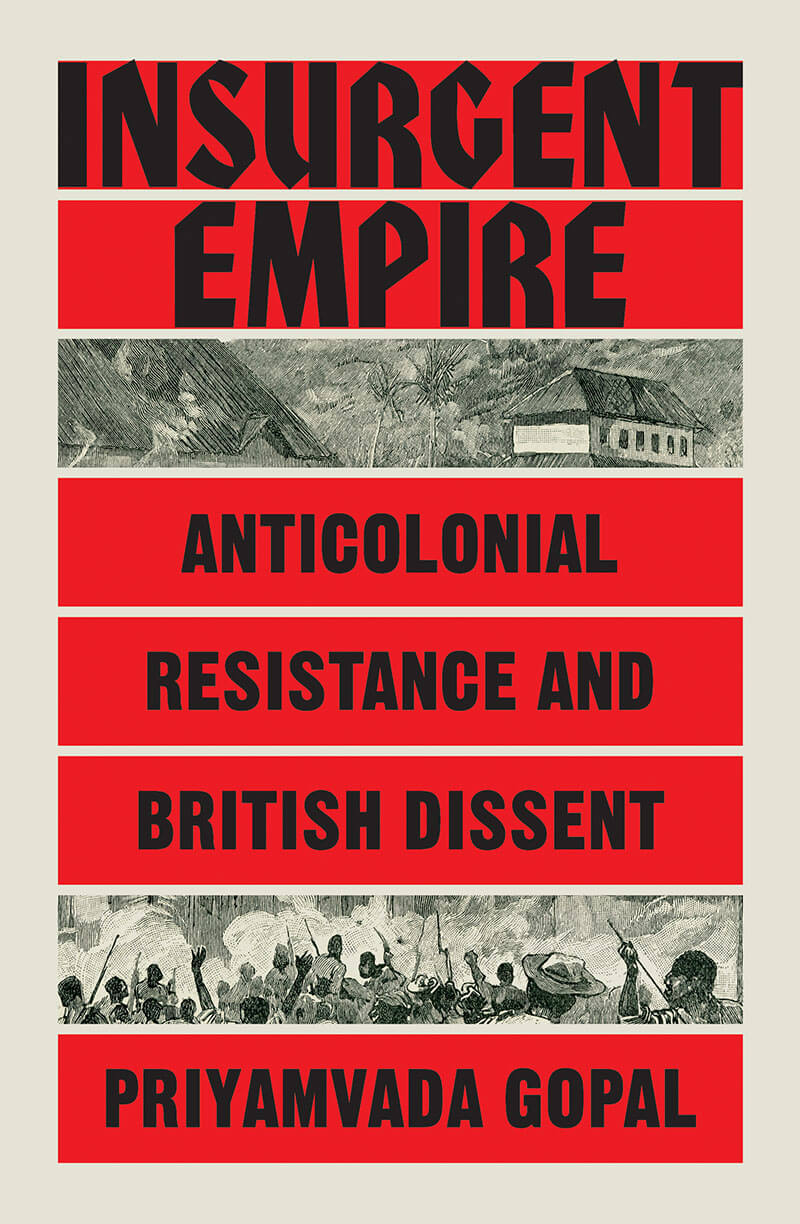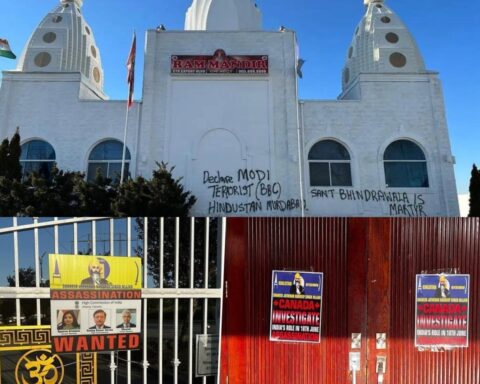Priyamvada Gopal is a Reader in Anglophone and Related Literatures in the faculty of English at the University of Cambridge. Earlier, she wrote “Literary Radicalism in India: Gender, Nation and the Transition to Independence” and “The Indian English Novel: Nation, History and Narration.”
In the book under review, Insurgent Empire: Anticolonial Resistance and British Dissent, Gopal’s copious research shows that anti-colonial resistance in various parts of the British Empire reinforced and stimulated British criticism of, and dissent from, what James Joyce called “the Brutish Empire.”
In her introduction, Gopal writes, “Both abolition and decolonization — twin outcomes of Britain’s expansionary colonial project over three centuries — are all too frequently regarded as deriving chiefly from the campaigning consciences of white British reformers or as the logical outcome of the liberal and liberalizing project that empire ostensibly always was, conquering in order to free. Despite an abundance of histories of resistance, and not only from a nationalist perspective, which make clear the constitutive role of resistance to the imperial project, ‘imperial initiative,’ — colonies ‘given’ their freedom when they were deemed ready for it — as the motive force of decolonization remains stubbornly entrenched in much political and public discourse in Britain … the ‘granting’ or ‘giving’ of independence to British colonies once they were deemed ‘ready’ for it, remains a cause for national self-congratulation …”
The inconvenient truth, as Gopal draws out, is that far from cheerfully bearing the white man’s burden, as Kipling called it, imperial rule necessitated constant vigilance and the frequent use of atrocious force to quell resistance in Egypt, India, Jamaica and elsewhere, as in the Mau Mau Rebellion in Kenya. This violent resistance encouraged the protests of moral philosophers, thinkers and idealists in Britain. The interplay of British dissent and anti-colonial resistance fills the volume.
The contents of the book are as follows:
Acknowledgements
Introduction: Enemies of Empire
Part I Crises and Connections
1. The Spirit of the Sepoy Host: The 1857 Uprising in India and Early British Critics of Empire
2. A Barbaric Independence: Rebel Voice and Transnational Solidarity Morant Bay 1865
3. The Accidental Anticolonialist: Egypt’s ‘Urabi’ Rebellion and Late Victorian Critiques of Imperialism
4. Passages to Internationalism: The ‘New Spirit’ in India and Edwardian Travellers
Part II Agitations and Alliances
5. The Interpreter of Insurgencies: Shapurji Saklatvala and Democratic Voice in Britain and India
6. The Revolt of the Oppressed World: British Internationalism from Meerut to the League against Imperialism
7. Black Voices Matter: Race, Resistance and Reverse Pedagogy in the Metropole
8. Internationalizing African Opinion: Race, Writing and Resistance
9. Smash Our Own Imperialism: George Padmore, the New Leader and ‘Colonial Fascism’
10. A Terrible Assertion of Discontent: ‘Mau Mau’ and the Imperial Benevolence
Epilogue: That Wondrous Horse of Freedom
Notes
Bibliography
Index
Many among the Indian elite may benefit from reading this book since they do not shrink from garlanding busts of the obscurest colonial icons on occasion or hailing Calcutta’s Victoria Memorial as an integral part of India’s heritage.
For example, Gopal describes how, in 2006, she participated in “Start the Week,” a BBC Radio show. She and Robert Beckford, a theologian, expressed doubts about the munificence and benevolence attributed to the British Empire by the other participants, including Niall Ferguson. Later, the BBC featured “a young American woman of Indian descent whose main purpose, it would seem, was to reassure the BBC’s listeners that I by no means represented young Indians who, she suggested, were either indifferent to or very positively disposed to the Empire.”
Ignorance, the main reason for such unhealthy attitudes, springs from the factual omissions in historical education syllabuses. The history taught in India, for example, rarely references Fenner Brockway, who supported Commonwealth independence movements. The Calcutta-born vegetarian was an active member of the India League, which advocated Indian independence. The Government of India honoured him with a Padma Bhushan, a civilian award, in 1989 but his name remains esoteric in India.
Gopal also refers to Wilfrid Scawen Blunt, a 19th-century poet and writer known as a leading light against imperialism, especially in Africa. In his poem “Satan Absolved,” the devil tells god: “The white man’s burden, Lord, is the burden of his cash,” arguing the imperialist is weighed down by his desire to make money out of the colonized.
When Britain was toiling against its Egyptian possessions Blunt was sent there to gauge public opinion. He met the popular Ahmed Urabi with a mutual admiration, which enabled them to communicate. Blunt was consequently in a position to explain Egyptian aspirations vigorously on returning home. He was, unfortunately, unable to change British attitudes in Whitehall and Cairo.
Ernest Jones is another of Gopal’s references, mostly unknown to educated Indians. The son of a British Army Major, Jones joined the Chartists, a workers’ movement for political reform in Britain. He was imprisoned for advocating the use of force. In prison, he wrote the epic “The Revolt of Hindostan.” It is said Jones wrote the poem in his blood on pages ripped from a Book of Common Prayer. Gopal connects the dots between British workers’ movements and fights for colonial self-rule like India’s First War of Independence.
The author allots a chapter on Shapurji Dorabji Saklatvala, the third Indian elected to the UK Parliament. All three were Parsis. Saklatvala was active in the League Against Imperialism since its formation in 1927. Educated Indians are familiar with the names Macaulay, Charnock, Hastings, Clive and Vasco da Gama, puffing them up with honorifics as part of their history — but not those of Blunt, Brockway, Jones or Saklatvala.
Ashoke Dasgupta is a freelance journalist and former editor of Compassionate Friend, Beauty Without Cruelty-India's magazine. He won a UNDP - Goethe Institute Award for Environmental Journalism in Nepal 1995, and the Canadian Ethnic Media Association's Best News/Feature Awards for 2004 and 2006. He got a scholarship to study journalism at Sheridan College Toronto in 2007, graduating with high honours. He has done internships at the Winnipeg Free Press and CBC Radio, and been published in the Winnipeg Free Press, the Calgary Herald and the Toronto Star.





